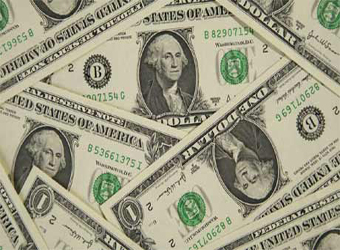The premium dealers demand for dollars in Egypt’s unofficial currency market is falling as the pound goes through what JPMorgan Asset Management called “non-chaotic maximum devaluation.”
The U.S. currency is selling for 7.47 Egyptian pounds in the Arab country’s so-called black market, a 7 percent premium to the official price, according to the average of three quotes from money exchangers compiled by Bloomberg. That’s down from a premium of 7.9 percent in an April 15 survey and 15 percent on April 2. The dealers, who run currency exchange businesses in Cairo, asked not to be identified because the trade is illegal.
The gap is narrowing as the pound depreciates at a faster pace at central bank currency auctions, which began in December to limit the supply of dollars to the market amid dwindling foreign reserves. The pound has lost 0.9 piaster per auction on average since the start of April, compared with a 0.5 piaster average decline in March, data compiled by Bloomberg show.
The pound is experiencing “non-chaotic maximum devaluation, but still looks like it’s somewhat expensive to fair value,” George Iwanicki, emerging market macro strategist at JP Morgan Asset Management, said in an e-mailed report today. “The issue in Egypt is political uncertainty, which has led to capital outflows and a very sharp ‘burn’ in the foreign exchange reserves base that the central bank enjoys.”
‘Increased Scrutiny’
Egypt is revising its economic plan amid negotiations for a $4.8 billion loan from the International Monetary Fund, the Washington-based lender’s Middle East and Central Asia department head Masood Ahmed said in an interview in Dubai today. The pound was little changed at 6.9819 a dollar as of 3:59 p.m. in Cairo, according to data compiled by Bloomberg. It has dropped 11 percent since the start of the currency auctions.
“The spread is closing after the pound was allowed to weaken faster over the last month and as FX bureaus became more careful because of increased central bank scrutiny,” Mona Mansour, chief economist at Cairo-based CI Capital, said by phone. “But we don’t expect further narrowing of the spread until there’s a solid government reform plan that leads to an IMF agreement.”
The yield on the government’s $1 billion of 5.75 percent bonds due in April 2020 advanced for a fourth day, rising two basis points, or 0.02 percentage point, to 7.55 percent. That’s the highest level on a closing basis in more than six weeks.
Bloomberg



